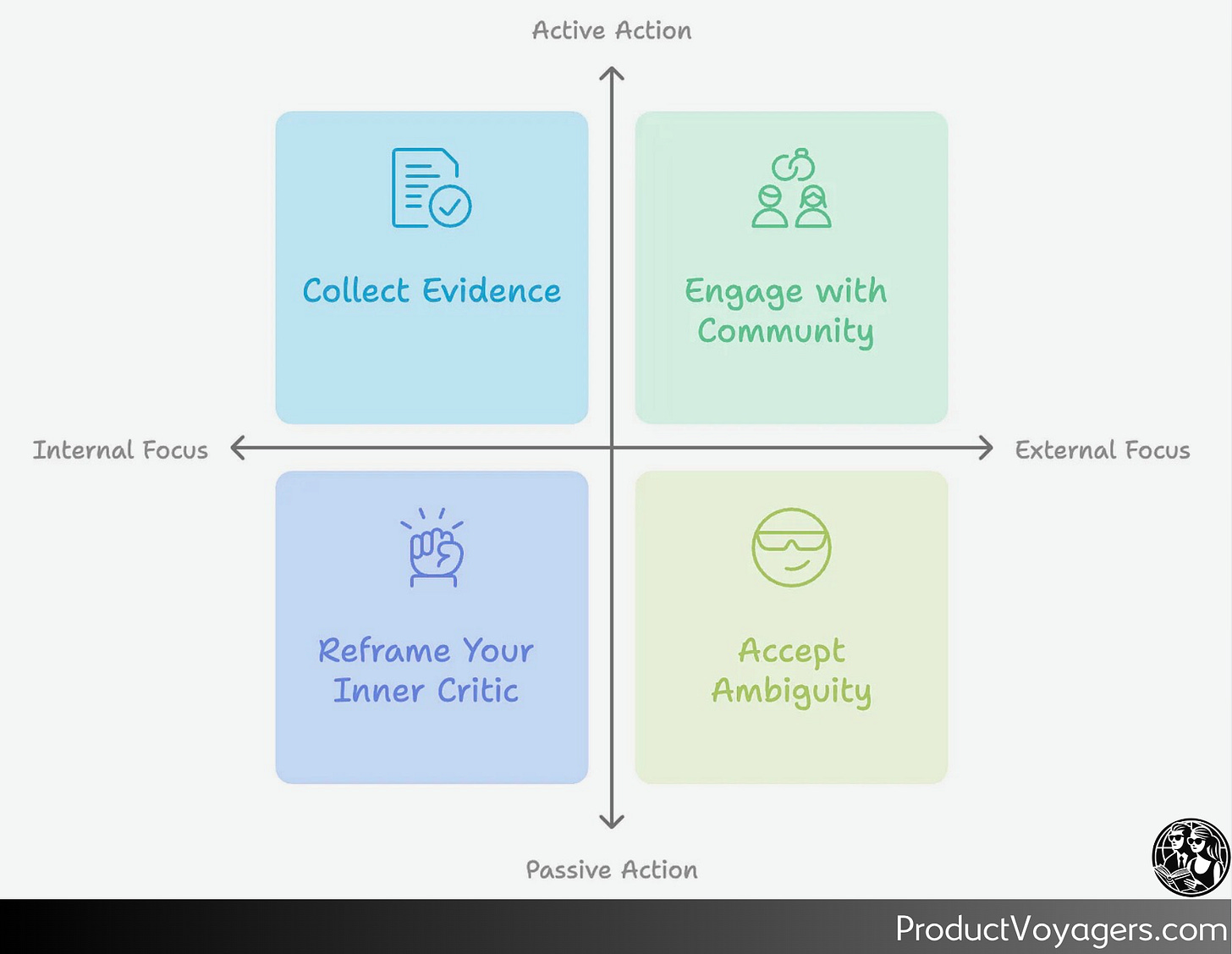Imposter Syndrome in Product Management: Stop Hearing 'You’re Not Enough'
Recognize, Confront, and Overcome the Self-Doubt That Holds You Back
Product Lead: Hey, got a sec?
Me: Sure, give me a minute.
I hit "Join" on the call, bracing for the worst. My stomach dropped. Was it about that email I sent? Or the delivery debate with the Engineering Manager? My mind was racing as I waited for the inevitable: feedback, criticism, or worse.
Product Lead: "Amazing work on the last delivery. You kept all the moving pieces together, and we nailed the KR. Leadership noticed, and we’d like you to take on the next cross-team initiative. You’ve got what it takes to lead it."
For about five seconds, I felt relieved—even proud. Then the doubts rushed in, faster than I could push them away:
What if I can’t deliver this time? What if they finally realize I’ve been winging it all along? …
It felt like the reflection in the mirror was shouting back at me: "You can’t do this."
That’s the thing about imposter syndrome—it doesn’t fade with success. It grows. Every accomplishment feels like borrowed time, another chance for the world to discover you’ve been faking it.
If that sounds familiar, you’re not alone. In product management, where ambiguity, shifting priorities, and constant accountability collide, it can feel like a storm that never quite passes. But storms don’t last forever. Let’s dig into why imposter syndrome shows up so often in PM roles—and how you can start quieting that relentless inner critic.
Imposter Syndrome: A Universal Struggle
Before we dive into the PM world, let’s start with some surprising truths:
Steve Jobs, the man who gave us the iPhone, sometimes felt like a fraud. Even as he transformed the world of technology, he’d wonder if he was just “fooling” people into believing in his vision.
Maya Angelou, a literary icon, confessed: “I have written eleven books, but each time I think, ‘Uh-oh, they’re going to find me out now.’”
Albert Einstein—yes, Einstein—referred to himself as an “involuntary swindler,” convinced his fame was undeserved.
If these giants felt like frauds, what does that tell us? Imposter syndrome isn’t about competence or talent. It’s about how our minds interpret success—and the stories we tell ourselves.
Why Product Managers Are Especially Vulnerable
Imposter syndrome can strike anyone, but product managers are particularly prone to it. Why? Because the role itself is a breeding ground for self-doubt.
1. Your Work Is Invisible
As a product manager, your impact often lies behind the scenes. Engineers build the product, designers craft the user experience, and sales teams close the deals. But what do you do?
You create alignment, make tough prioritization calls, and steer the ship. When a feature succeeds, the spotlight often falls on the team that built it. When it fails, the accountability often falls on you.
It’s easy to feel like you’re not doing enough when your contributions are intangible.
2. You’re a Jack of All Trades, Master of None
Product managers are expected to “speak the language” of engineers, designers, marketers, and business leaders. But you’ll never be the best coder or the most creative designer—and that’s not your job.
Still, when you’re surrounded by specialists, it’s natural to feel like you’re faking it.
3. The LinkedIn Trap
And then there’s LinkedIn—the endless scroll of curated success stories that can make you question everything.
You see someone celebrating a 10-million-user milestone, another sharing their flawless OKR achievement, and someone else getting promoted to VP of Product at a unicorn startup. Meanwhile, you’re knee-deep in messy stakeholder alignment sessions or reworking yet another roadmap draft.
It’s hard not to think: “Why am I not doing something that impressive? Am I even good at this?”
But let’s remind ourselves: LinkedIn is a highlight reel. It doesn’t show the late nights, the missed bets, or the messy middle. Comparing your daily grind to someone else’s polished narrative is not only unfair—it’s damaging.
When Feedback Stings
Nothing fuels imposter syndrome quite like a missed promotion. Imagine this:
You’ve worked tirelessly—late nights, tough decisions, navigating ambiguity. When promotion season comes, you’re hopeful. Confident, even. Then you hear:
“We don’t think it’s your time yet.”
The voice in your head screams: “Maybe I’m not as good as I thought. Maybe I’ve been fooling everyone all along.”
At this point, it’s natural to feel stuck—maybe even angry. 😬 Your brain is spinning with questions like:
“What else could I have done?” 🤷♂️
“Do they even see my effort?” 😤
“Am I even in the right role?” 🤔
In moments like these, all the advice about “staying positive” can feel hollow. Let’s skip the platitudes—you need a plan.
So, What on Earth Do I Do Now?
There’s a way to turn things around—read first, and then decide. Don’t say “No, I won’t read.” Please!
Step 1: Find Evidence
Ground yourself in the facts. Write down your key achievements over the past year. Look at feedback from peers or stakeholders. This isn’t about bragging—it’s about reminding yourself of your value.
Shift the inner narrative from:
“I’m not enough” → “Here’s proof of my contributions.”
Step 2: Accept the Setback
Before you act, take a moment to acknowledge how you feel. Frustration? Disappointment? That’s okay—it’s normal. Acceptance isn’t about giving up; it’s about creating space for clarity.
Ask yourself: “What’s in my control right now?”
Focus on what you can influence moving forward.
Step 3: Listen to the Feedback
Instead of seeing the setback as a personal failure, try viewing it as data. Feedback is fuel for growth—if you reframe it.
Ask yourself:
“What can I learn from this?”
“What adjustments can I make to better align with expectations?”
A missed promotion doesn’t erase your worth—it’s a stepping stone for growth. 🌱
Step 4: Engage with Mentors
Reach out to someone you trust—someone who’s been there. Mentors can offer fresh perspectives, share their own stories of overcoming setbacks, and help you turn frustration into actionable steps.
How to Overcome It: The CARE Framework
Still feeling unsure? That’s okay. Sometimes, our minds need a structure to process these emotions. Let’s make it simple: CARE Framework is a practical approach to overcoming imposter syndrome.
C: Collect Evidence 🗃️
Your inner critic thrives on ignoring your wins. To fight back, you need to collect proof of your success.
Tip: Start a “Win Journal.” Every week, write down three things you did well. They don’t have to be monumental—solving a small team conflict or simplifying a process counts. Over time, you’ll build an archive of evidence that you are capable.
A: Accept Ambiguity 🌫️
One of the hardest parts of being a PM is navigating constant ambiguity. You’ll rarely have perfect data or a clear roadmap. Instead of seeing this as a failure, reframe it as part of the role.
Tip: When faced with uncertainty, focus on what you can do.
Instead of:
“I don’t have all the answers,” ask: “What’s the next small step we can take?”
“What if this fails?” ask: “What can we learn from trying?”
R: Reframe Your Inner Critic 🧠
Your inner voice can be ruthless. It tells you that your success is luck and your failures are proof you’re not good enough. To overcome this, you need to reframe it.
Tip: Use the “Best Friend Test.” When you catch yourself thinking, “I’m not good enough,” imagine your best friend saying that to you. How would you respond? With kindness, encouragement, and facts.
Now, practice giving yourself that same compassion. 💛
E: Engage with Community 🌍
Imposter syndrome thrives in isolation. When you connect with others, you realize you’re not alone—and that even the people you admire have felt the same doubts.
Tip: Join communities like Product Voyagers, where PMs openly share their challenges and wins. Sometimes, just hearing someone else say, “Me too,” can be enough to shift your perspective. You’re surrounded with many communities, use that advantage to yourself.
Together, these steps build a cycle of clarity and confidence, helping you shift from doubt to empowerment over time.
Why This Works
The CARE Framework guides you from processing the sting of a setback to building habits that quiet imposter syndrome over time.
It’s not about ignoring self-doubt—it’s about working through it and moving forward.
The Truth About Imposter Syndrome
Even the most successful people feel like imposters sometimes. The difference? They’ve learned to keep going—not because they’re fearless, but because they’ve learned to trust their journey.
Imposter syndrome isn’t a sign of failure—it’s a sign that you care. You care about your team, your product, and your role. That’s not a weakness; that’s your strength.
So the next time that voice whispers, “You’re not enough,” pause. Look back at your wins. Embrace the uncertainty. Reframe that inner critic. And lean into your community—you don’t have to face it alone.
You belong here. You’ve earned your seat at the table. And on the days you forget, we’ll be here at Product Voyagers to remind you.
Before you close this tab and dive back into work, take a moment for yourself: write down three wins from this week—big or small. It’s your proof that you’re doing better than you think. And if this resonated with you, share it with someone who might need a reminder too.




One of the best articles I've read about imposter syndrome. Very thoughtful, well crafted and an actionable framework. Lending yourself the kind of compassion you would a friend is what I have found to be a real game-changer.
I particularly loved > “What if this fails?” ask: “What can we learn from trying?” 👌
Very good! A must read!